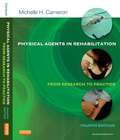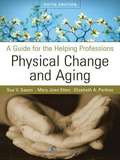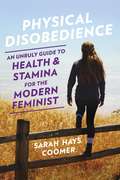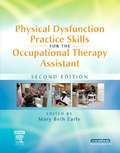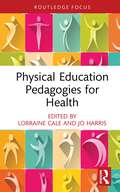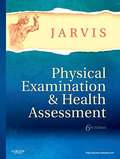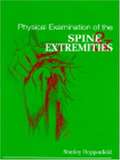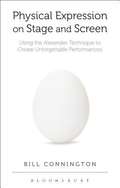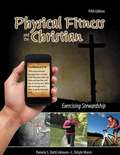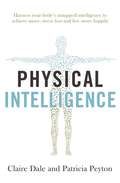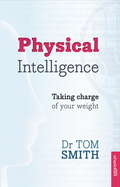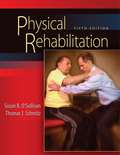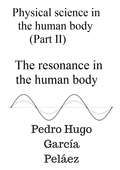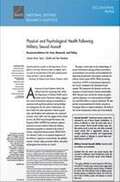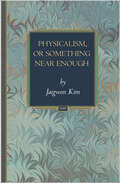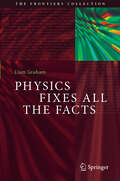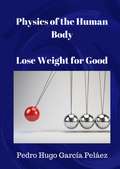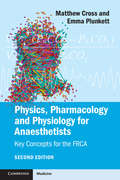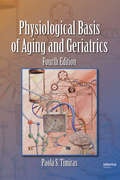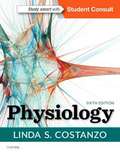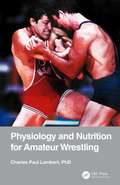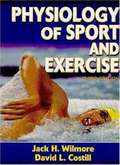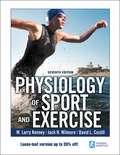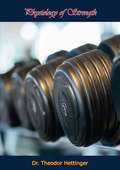- Table View
- List View
Physical Agents in Rehabilitation: From Research To Practice
by Michelle H. CameronPresenting a variety of treatment choices supported by the latest clinical research, Physical Agents in Rehabilitation: From Research to Practice, 4th Edition is your guide to the safe, most effective use of physical agents in your rehabilitation practice. Coverage in this new edition includes the most up-to-date information on thermal agents, ultrasound, electrical currents, hydrotherapy, traction, compression, lasers, and electromagnetic radiation. Straightforward explanations make it easy to integrate physical agents into your patients' overall rehabilitation plans.
Physical Change and Aging: A Guide for the Helping Professions (5th edition)
by Sue V. Saxon Mary Jean Etten Elizabeth A. PerkinsAlthough this book focuses primarily on physical changes and the common pathologies associated with aging, it also considers the psychological and social implications of such changes for human behavior. Since aging is a complex process, it is impossible to consider biological or physical aspects without a comparable concern for the psychological, emotional, and social factors involved.
Physical Disobedience: An Unruly Guide to Health and Stamina for the Modern Feminist
by Sarah Hays CoomerA manual for activism that begins with our most powerful asset--our bodiesEven as a wave of renewed feminism swells, too many women continue to starve, stuff, overwork, or neglect our bodies in pursuit of paper-thin ideals. "Fitness" has been co-opted by the beauty industry. We associate it with appearance when we should associate it with power. Grounded in advocacy with a rowdy, accessible spirit, Physical Disobedience asserts that denigrating our bodies is, in practice, an act of submission to inequality. But when we strengthen ourselves--taking broad command of our individual physicality--we reclaim our authority and build stamina for the literal work of activism: the protests, community service, and emotional resilience it takes to face the news and stay engaged. Physical Disobedience introduces a breathtaking new perspective on wellness by encouraging nonviolence toward our bodies, revitalizing them through diet and exercise, fashion and social media, alternative therapies, music, and motherhood. The goal is no longer to keep our bodies in check. The goal is to ignite them, to set them free, and have a mighty fine time doing it.
Physical Dysfunction Practice Skills For The Occupational Therapy Assistant
by Mary Beth EarlyAimed at students training to become occupational therapy assistants, this textbook teaches key techniques designed to help patients to participate in personally selected and valued occupations. It is assumed that students have already completed basic anatomy and physiology and foundation OT courses. The second edition has been revised to conform to the AOTA's Occupational Therapy Practice Framework.
Physical Education Pedagogies for Health (Routledge Focus on Sport Pedagogy)
by Lorraine Cale Jo HarrisThis book focuses on health within physical education (PE) and specifically on PE pedagogies for health. It gives practitioners and students the knowledge, understanding, skills and confidence to employ effective health pedagogies and practices in their work, and to promote healthy, active lifestyles within their PE curricula. Drawing on cutting-edge research, the book highlights key pedagogical issues and debates concerning the delivery of health in PE, and their implications for practice, such as in policy and curriculum development. It explores recent recommendations and developments in PE pedagogies for health which have been shown to enhance, or have the potential to enhance, practice in the area, as well as future opportunities for doing so. It provides practical tools that bridge the gap between research and application, including learning activities and questions that encourage the reader to reflect on their own professional practice and identify actions for developing their own pedagogy, practice and curricula in the area. This is essential reading for all PE teachers, coaches working with children or young people, teacher and coach educators, and trainee teachers and coaches.
Physical Examination and Health Assessment (6th Edition)
by Carolyn JarvisWith an easy-to-read approach and unmatched learning support, Physical Examination and Health Assessment, 6th Edition offers a clear, logical, and holistic approach to physical exam across the lifespan. Detailed illustrations, summary checklists, and new learning resources ensure that you learn all the skills you need to know. This gold standard in physical exam reflects what is going on in nursing today with coverage of emerging trends and new evidence-based content.
Physical Examination of the Spine and Extremities
by Stanley HoppenfeldUseful to students and clinicians, this text covers the process of physical examination of the spine and extremities.
Physical Expression on Stage and Screen: Using the Alexander Technique to Create Unforgettable Performances
by Bill ConningtonPhysical Expression on Stage and Screen Bill Connington, a renowned teacher of the Alexander Technique, shows you how to recognize and release the tension that keeps you from performing at your best. If you're ever not certain of what to do with your hands or how to make a meaningful gesture, or if your movement feels fine in daily life but then you suddenly become self-conscious when onstage or in front of a camera.
Physical Fitness and the Christian: Exercising Stewardship (Fifth Edition)
by Pamela Diehl Johnson L. Delyte MorrisThe book helps the reader to understand the details of a physical fitness program as a stewardship responsibility and appreciate the life-long personal responsibility involved in pursuing physical fitness.
Physical Intelligence: Harness your body's untapped intelligence to achieve more, stress less and live more happily
by Claire Dale Patricia PeytonThe highly successful four-part strategy for raising your performance at work and home so that you can thrive in a busy, challenging world, from the experts who have worked with Fortune 100 and Fortune 500 companies across the globe. Do you wish you could be more focused and productive? Would you like to ensure your most confident performance when the stakes are high and your stress levels are even higher? The way your body reacts in any given situation determines your ability to think clearly and your capacity for managing your emotions. When you understand the way your body reacts and how to manage it, your physical intelligence, you can handle that stressful presentation, the make-or-break meeting and the important pitch. Claire Dale and Patricia Peyton have spent the past thirty years helping business leaders, top performers and professional athletes improve their physical intelligence in order to achieve outstanding success and a deeper sense of fulfillment. This practical guide contains the effective techniques you need to develop your strength, flexibility, resilience and endurance, leaving you feeling confident and fully equipped to deal with whatever comes your way. Each step-by-step strategy can be easily integrated into a busy day and is combined with useful tips and inspiring stories of people who have turned their lives around through physical intelligence.
Physical Intelligence: How To Take Charge Of Your Weight
by Tom Smith Dr Tom SmithThis book analyses the often-complex factors that influence weight gain, from our hormonal make-up to our eating psychology. Full of evidence-based research and real-life case histories, it gives intelligent advice on what to do when confronted with the need to tackle your health, or that of your child. It emphasises that exercise is key and that eating is one of the joys of life, not a medication. Topics include: Our hunter-gathering past; Exercise intelligence; Why we don't exercise enough; Hydration intelligence; Nutritional intelligence; Fasting intelligence; Antioxidants, vitamins, minerals and other supplements.
Physical Intelligence: How To Take Charge Of Your Weight
by Tom Smith Dr Tom SmithThis book analyses the often-complex factors that influence weight gain, from our hormonal make-up to our eating psychology. Full of evidence-based research and real-life case histories, it gives intelligent advice on what to do when confronted with the need to tackle your health, or that of your child. It emphasises that exercise is key and that eating is one of the joys of life, not a medication. Topics include: Our hunter-gathering past; Exercise intelligence; Why we don't exercise enough; Hydration intelligence; Nutritional intelligence; Fasting intelligence; Antioxidants, vitamins, minerals and other supplements.
Physical Rehabilitation (5th Edition)
by Susan B. O'Sullivan Thomas J. SchmitzThe text is designed to provide a comprehensive approach to the rehabilitation management of adult patients and is intended to serve as a primary textbook for professional-level physical therapy students, and as an important resource for practicing therapists as well as for other rehabilitation professionals.
Physical Science in the Human Body (part II) The Resonance in the Human Body
by PEDRO HUGO GARCÍA PELÁEZThis book describes equivalent systems that simulate resonance in the human body. In this way we can get systems that resonate with the human body and choose the one that is the most comfortable or easy.
Physical and Psychological Health Following Military Sexual Assault: Recommendations for Care, Research, and Policy
by Terri Tanielian Terry L. Schell Coreen FarrisThis paper reviews data on the prevalence of sexual assault among servicemembers, predictors of disclosure, efforts to improve disclosure, victim needs and DoD efforts to provide necessary resources in the immediate aftermath of a sexual assault. The authors compared civilian and DoD guidelines for care and found them to be generally consistent. However, little is known about the fidelity with which DoD recommendations are implemented.
Physicalism, or Something Near Enough (Princeton Monographs in Philosophy #19)
by Jaegwon KimContemporary discussions in philosophy of mind have largely been shaped by physicalism, the doctrine that all phenomena are ultimately physical. Here, Jaegwon Kim presents the most comprehensive and systematic presentation yet of his influential ideas on the mind-body problem. He seeks to determine, after half a century of debate: What kind of (or "how much") physicalism can we lay claim to? He begins by laying out mental causation and consciousness as the two principal challenges to contemporary physicalism. How can minds exercise their causal powers in a physical world? Is a physicalist account of consciousness possible? The book's starting point is the "supervenience" argument (sometimes called the "exclusion" argument), which Kim reformulates in an extended defense. This argument shows that the contemporary physicalist faces a stark choice between reductionism (the idea that mental phenomena are physically reducible) and epiphenomenalism (the view that mental phenomena are causally impotent). Along the way, Kim presents a novel argument showing that Cartesian substance dualism offers no help with mental causation. Mind-body reduction, therefore, is required to save mental causation. But are minds physically reducible? Kim argues that all but one type of mental phenomena are reducible, including intentional mental phenomena, such as beliefs and desires. The apparent exceptions are the intrinsic, felt qualities of conscious experiences ("qualia"). Kim argues, however, that certain relational properties of qualia, in particular their similarities and differences, are behaviorally manifest and hence in principle reducible, and that it is these relational properties of qualia that are central to their cognitive roles. The causal efficacy of qualia, therefore, is not entirely lost. According to Kim, then, while physicalism is not the whole truth, it is the truth near enough.
Physics Fixes All the Facts (The Frontiers Collection)
by Liam GrahamComplex systems seem to magically emerge from the interactions of their parts. A whirlpool emerges from water molecules. A living cell from organic molecules. You emerge from the cells of your body. Not since chaos has a concept from physics spread like wildfire to other disciplines. Emergence can be found from chemistry to economics; from psychology to ecology. At its heart is the alluring idea that there’s more to the world than physics, that there is a holistic component to nature, an edge of mystery. “Physics Fixes All the Facts” starts by taking you on a tour through a fascinating world of complexity, exploring phenomena from the inside of an atomic nucleus to bacterial behaviour to the ability of your thoughts to affect the world. These examples are used along with a thorough exploration of the philosophical literature to untangle the notoriously poorly defined concept of emergence. This reveals something surprising: the term emergence is redundant. In its weak form it is so weak that it applies to everything. In its strong form it is so restrictive that it is like the belief that there are pixies in your garden, impossible to exclude but not worth spending your time on. Emergence either applies to all systems or to none. Rather than telling us something about the nature of the world, it is an illusion, an artefact of our cognitive limitations. The past decade has seen a dozen or so monographs and collections about emergence, almost all resolutely supportive of the concept. This book aims to redress the balance. But it is more than just a campaign against the idea of emergence. Graham presents a framework called Austere Physicalism and argues that it is the only coherent way to view the world. He uses this framework to reinterpret so-called emergent phenomena and investigates its wider implications for science. In this radically materialist view, we are nothing but physical systems among others. “Physics Fixes All the Facts” ends by exploring what this means for our sense of free will and consciousness. The book will appeal to academics in fields which use the concepts of complexity or emergence. Scientists and philosophers alike will find unexpected and exciting ideas in these pages. But the target audience is much broader including students who want to add context to their studies and the intellectually curious with some scientific background.
Physics of the Human Body. Lose Weight for Good.
by PEDRO HUGO GARCÍA PELÁEZ Morwenna FellowsThe best book for losing weight without dieting. Do not let them fool you. 90% of weight loss books are a con or are based on pointless diets. This is a scientific method that works perfectly, that has been calibrated over years and approved by different committees of doctors in physics. This is the only book that applies the laws of physics to weight loss.
Physics, Pharmacology and Physiology for Anaesthetists
by Matthew E. Cross Emma PlunkettA key requirement of the primary and final FRCA examinations is a sound understanding of the basic sciences behind anaesthetic practice. It is important to be able to describe these principles clearly, particularly in the viva section of the examinations. This fully updated new edition of a key title in the field of anaesthesia provides all the important graphs, definitions and equations which may be covered in the examinations, together with clear and concise explanations of how to present them to the examiner and why they are important. Packed full of precise, clear diagrams with well structured explanations, and with all key definitions, derivations and statistics, this is an essential study aid for all FRCA examination candidates.
Physiological Basis of Aging and Geriatrics (Fourth Edition)
by Paola S. TimirasThis Fourth Edition offers a complete profile of the aging process at all levels, from molecules and cells to demography and evolution. The text includes aspects of individual, comparative, and differential aging, and discussions of theories and mechanisms of aging.
Physiology
by Linda S. CostanzoPhysiology, 6th Edition ideal for coursework and USMLE preparation. Well-designed figures and tables provide handy visuals for procedures or physiologic equations, and step-by-step explanations clarify challenging concepts. This full-color, manageably-sized text offers a comprehensive and consistent overview of core physiologic concepts at the organ system and cellular levels, making complex principles easy to understand.
Physiology and Nutrition for Amateur Wrestling
by Charles Paul LambertPhysiology and Nutrition for Amateur Wrestling is essential reading for amateur wrestlers and their coaches with a desire to learn about physiological training and nutrition for their sport. Written by Charles Paul Lambert, PhD, a competitive wrestler and academic expert in high-intensity exercise, this book describes the primary physiological systems involved in amateur wrestling. Readers will learn how to substantially optimize performance and discover ways to improve body composition specific to the sport of amateur wrestling. The book addresses important issues, including relative energy deficiency in sport, debates around weight loss, the specificities of training and nutrition for female wrestlers, as well as strategies on keeping fit in the years after a competitive career. Features: Discusses strategies for monitoring overall training load to prevent overtraining and optimize training Includes optimal nutritional fueling plans for wrestlers written by a Certified Coach with USA Wrestling and compares different dietary approaches to losing weight and fat Provides optimal rehydration and refueling plans based on situational needs in the post-weigh-in period Both scientific and practical, Physiology and Nutrition for Amateur Wrestling will appeal to wrestlers, high-school and college coaches, and those working in applied physiology research and exercise science.
Physiology of Sport and Exercise
by Jack H. Wilmore David L. CostillHow does your body respond to the high physiological demands of physical activity/
Physiology of Sport and Exercise
by Jack H. Wilmore David L. Costill W. Larry KenneyThis is the loose-leaf version of Physiology of Sport and Exercise, Seventh Edition With Web Study Guide. Combining research with extensive visual aids, this resource offers a simple way for students to develop an understanding of the body's abilities to perform various types and intensities of exercise and sport, to adapt to stressful situations, and to improve its physiological capacities. This seventh edition has been updated based on the most recent position stands, standards, and guidelines in the field of sport and exercise physiology.
Physiology of Strength
by Dr Theodor Hettinger M. H. Thurlwell Prof. Arthur H. SteinhausFirst published in 1961, “[T]his book is the result of ten years of research and experiment in the problems of muscle strength and muscle training at the Max-Planck-Institut für Arbeitsphysiologie, Dortmund, Germany supplemented by further work at the Lankenau Hospital, Division of Research, Philadelphia, Pennsylvania. There is provided the present status of these problems, and there is demonstrated how muscle strength may be built and maintained with a minimum of time and effort.“The methods used are adaptable, with suitable modification, to children, to average young people, to athletes in training, to sedentary workers and older persons who wish to maintain bodily strength, and to those who have undergone surgery and need rehabilitation of the muscle structure—in short, to anyone who wishes to develop and maintain good muscle tone.“A strong and well-built body not only has pleasing appearance, it permits the undertaking of arduous physical activities or active sports without undue fatigue, and with real enjoyment.“It is the author’s hope that in this age of fast living and nervous tension, when there often seems neither time nor place for extensive exercise, this book will assist those who wish to maintain bodily strength and fitness—simply, at home, without elaborate equipment—on a do-it-yourself basis. It should prove of special benefit to teachers of physical education and rehabilitation.”—THEODOR HETTINGER, M.D.
